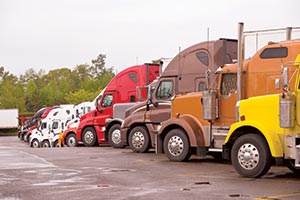Rental Spaces, Better Data Could Ease Parking Crunch

This story appears in the Jan. 16 print edition of Transport Topics.
Finding a secure place to park or drop a trailer has become an all-too-common challenge for truck drivers, but some carriers have found a novel way to help ease that problem — renting parking spaces through third-party firms.
At the same time, states are investing in technology to give truckers greater access to real-time information on parking availability.
The parking issue can be particularly tricky for high-value freight.
Mesilla Valley Transportation, faced with a shortage of safe places to park trailers loaded with valuable cargo, began renting spaces in secure lots through Terminal Exchange Services, or TXS.
“We haul a lot of high-value loads like TVs and electronics, and we had loads stolen from truck stops,” said JoJohn Vega, Mesilla Valley’s vice president of operations.
“With TXS, our drivers can drop their trailers off at one of their lots and then bobtail to the truck stop without worrying about the cargo. If they’re hooked to the trailer, they’re responsible for the cargo,” he said.
The parking facilities available through TXS are fenced and well-lit, watched by cameras and accessible only by prior arrangement. Addresses of the lots aren’t provided until a client agrees to rent space.
“It’s cheaper for me to rent from TXS than to build a terminal,” Vega added.
MVT, based in Las Cruces, New Mexico, ranks No. 66 on the Transport Topics Top 100 list of the largest for-hire carriers in the United States and Canada.
TXS founder Jon Paul Harwood, son of a veteran longhaul trucker from California, first saw the value in providing truck parking when a friend asked him to help market a truck lot in Ontario, California. From there, he went out on his own as TXS in 2007.
“I went to a truck stop and wrote down the names of the companies on the backs of the trucks,” Harwood said. “I reached out to operations managers and asked whether they had parking needs. If they did, I would search for available yards in those cities. I used Craigslist and a lot of word of mouth. I’d call and ask if they had room for X number of trucks and whether they were interested in leasing some space. These companies had never thought they could make money this way.”
Harwood had found his niche. By 2015, his company’s revenue had risen to between $3.5 million and $4 million and is growing 15% to 20% per year, he said.
TXS currently rents spaces at 650 secure lots nationwide, essentially acting as a middleman connecting parking providers — many of them carriers — with fleets looking for spots for their trailers.
More than a dozen of those yards are owned by Phoenix- based Knight Transportation Inc., which ranks No. 29 on the for-hire TT100.
When Glen Thomas took over as Knight’s director of corporate real estate and facilities in 2014, he was dismayed by how inefficiently those parking lots were managed internally.
“Collecting and managing the leases was taking a lot of time,” Thomas said. “We probably had 50 or 60 of these agreements.”
Now TXS handles the billing, collecting and management of the firms that use the spaces, he said.
“And when I need to lease spaces in a remote area where we don’t have a nearby location, I just go to TXS and they can typically find me what I need,” Thomas added. “It’s not cheap to build a secure parking area. You’ve got to have fencing, lighting, access control, guards and cameras.”
While Harwood is making the high demand for truck parking work for him in the private sector, Rick Warner, CEO of Truck Specialized Parking Services, focuses on the parking areas that state departments of transportation provide for trucks as well as nearby private facilities that can handle the overflow.
TSPS is working to build a network of real-time parking information for truckers by partnering with state DOTs. The company installs sensor equipment at parking locations to track the number of open truck spaces and shares that information through electronic highway signs and a mobile application.
“Seventy percent of our country’s goods move by truck and truckers are spending an hour a day looking for parking,” Warner said. “That has economic and safety implications. Our guiding purpose is to help truckers be more efficient and productive.”
TSPS’ first client, Michigan DOT, recently extended its initial two-year contract for three more years, this time with $699,000 in state funding. Wisconsin’s DOT began its partnership with TSPS in December. Colorado is set to follow this spring.
“Public facilities fill up first, [so] trucks were parking on the shoulders and the entrance and exit ramps to the rest areas,” said Collin Castle, MDOT’s connected vehicle specialist. “That becomes a safety problem, so we thought having private facilities as part of the overall system was pretty integral.”
That’s why MDOT hired TSPS to provide information about the number of available spaces on Interstate 94 between Battle Creek and the Indiana border.
“We realized that maybe the best way to approach it would be to have some sort of a third party interact with those facilities on more of a business-to-business relationship,” Castle said. “Ten thousand truckers travel that route every day. We’re putting parking information on electronic signs, and it’s available on apps. We hope to keep expanding and make the information more useful for the truckers.”
Meanwhile, Wisconsin DOT is using $4 million in federal funds to pay TSPS to run some of its parking areas, beginning with four on I-94. Seven more are expected to come online by the end of the year.
“We’re embracing technology to help commercial drivers find the parking facilities they need, when they need them,” then-WisDOT Secretary Mark Gottlieb said at a Dec. 15 ribbon-cutting. “Considering that Wisconsin has seen a 20% increase in commercial truck traffic over the last four years, it’s important that we continue to take steps like this to ensure increased safety and mobility on our highways.”
Citing data from a recent study by the American Transportation Research Institute, Gottlieb added that the average over-the-road trucker spends 56 minutes every day looking for safe places to park, which translates into $4,600 annually in lost wages.
Truck parking ranked fourth on ATRI’s 2016 list of the most critical issues facing the industry.




